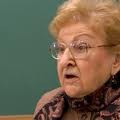It’s easy to see why this 40-minute documentary was nominated for an Oscar last year (2004): the story of Sister Rose Thering, an 84-year-old Dominican nun from rural Wisconsin who influenced the Vatican to retire its centuries-old bias against Jews, is powerful and compelling.
Even as a girl, Sister Rose couldn’t understand how Catholics could disparage the Jews, the people from whom the Christian saviour emerged, and presume they were condemned to wander the earth? “Jesus lived a Jew, died a Jew. How is it possible for us Catholics not to love his people?” she used to wonder.
 In 1957 she devoted her doctoral thesis to an examination of the anti-Jewish doctrine in authorized Catholic teaching materials. “To my sorrow — not surprise, but sorrow — I saw some very ugly terms,” she recounted. Some of the texts repeated blood libels, for example, and taught that the Jews were god-killers and “children of the devil.”
In 1957 she devoted her doctoral thesis to an examination of the anti-Jewish doctrine in authorized Catholic teaching materials. “To my sorrow — not surprise, but sorrow — I saw some very ugly terms,” she recounted. Some of the texts repeated blood libels, for example, and taught that the Jews were god-killers and “children of the devil.”
Although some church elders disparaged her for washing its dirty laundry in public, her thesis influenced the Second Vatican Council to forever alter the church’s relationship to the Jews with the following declaration: “What happened in His passion cannot be charged against all the Jews, without distinction, then alive, nor against the Jews of today.”
The 1965 statement meant that Catholics could no longer blame Jews for the death of Christ. “No more, how how, can anybody say it,” said the feisty Rose with gusto and pride. “And if you ever hear somebody say that, you can tell them, ‘You better study your religion, because it doesn’t teach that any more.'”
Sister Rose’s passion is revealed in scenes where she protests Kurt Waldheim’s appointment as president of Austria and disparages actor-filmmaker Mel Gibson for the deceptiveness and historical inaccuracies of his controversial film The Passion, which she called “shocking.”
A board member of a Christian college, she was equally shocked by the wave of antisemitic incidents that hit the college after Gibson’s film opened. She expressed frustration that despite the church’s revised position, old antisemitic attitudes die hard.
“On a popular level, it persists — the feeling that the Jews were responsible for the killing of Christ and bear a special burden for it,” she said. “They changed the textbooks but not what’s in the teacher’s mind.”
Filmmaker Oren Jacoby also included scenes of the late Pope John Paul II visiting Auschwitz and the Western Wall in Jerusalem. “This is the first pope who has knelt down and prayed for Abraham’s children,” Rose observed.
A former participant in a New Jersey commission on Holocaust education, she presently lives in a Jewish retirement home in New Jersey. “Sister Rose thoroughly identifies with Jewish history and Jewish feelings,” said one commentator. “She responds to everything almost with a Jewish heart.”
Appropriately, the film ends with Ruth’s famous quote to Naomi from the Book of Ruth: “Your people will be my people; your God will be my God.” ♦
© 2005






